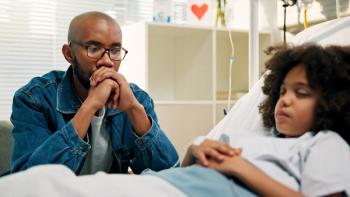
Fertility and Family Planning: Supportive Patient Conversations
When nurses speak to patients about fertility and family planning options, there are several things to keep in mind.
By Angelique Caba, LCSW-R, Director of Social Work Administration
There are a multitude of questions that come to mind when nurses ask themselves how we can best support patients diagnosed with cancer. Given the sense of urgency that often accompanies a cancer diagnosis, supporting a patient’s fertility or family planning options is often not at the top of that list.
However, the most important question nurses can ask themselves is, “How can I support the whole patient?” The answer to this question often involves going beyond the cancer and examining aspects of their lives that will likely be impacted as a result of their disease. While no one can foresee a patient’s outcome or what their future holds, we can do our best to ensure they live a full life—one with many of the same options those without cancer would have. One way to do this is by providing patients, or the parents or legal guardians of pediatric patients, with information that empowers them to make educated and insightful decisions.
But when it comes to a person’s fertility or family planning options, when is the best time to have these discussions? The conversation should happen sooner rather than later. The American Society of Clinical Oncology (ASCO) issued a clinical practice guideline update addressing fertility preservation in adults and children with cancer.1 These guidelines encourage healthcare teams caring for adult and pediatric patients with cancer to address the possible impact on fertility as soon as possible. Similarly, the guidelines encourage medical teams to refer patients who have expressed interest in preserving their fertility to reproductive specialists, and to document these discussions in the patient’s medical records.
When nurses speak to patients about fertility and family planning options, there are several things to keep in mind:
It is their choice. Patients often struggle with not knowing whether or not they want a family. This is especially challenging for pediatric patients and their parents. However, they do not need to decide now if they want to have a family. The question of whether they want to have a family or not is not the one they have to answer. Instead, the question they must ask themselves is, “Do you want the choice to have the family later on?”
Working towards preserving fertility provides patients with more options should they decide they want a family down the road. With all the uncertainty that comes along with a cancer diagnosis, many patients find it particularly empowering to preserve the option to have a family, even if they may later decide not to.
Inform patients of the options. Cancer treatments can affect the reproductive system in many ways, but not all cancers and cancer treatments will affect a patient’s fertility. The impact on one’s fertility may vary but often fall into the categories of normal, temporary, compromised or permanent. Where a patient falls within these categories can help determine what options may be best for them: natural conception; medically assisted conception; donor eggs, embryos or sperm; gestational surrogacy or adoption. What is important to keep in mind is that while the path they imagined taking may be quite different, the destination is the same.
Provide patient referrals. Regardless of medical expertise the decision ultimately lies with the patient. However, information is paramount. The Oncofertility Consortium (
When possible, refer patients to reproductive specialists to help patients explore possible fertility preservation, discuss options available and assess risks, eligibility and costs. Organizations such as Fertile Action (
Connect patients with support. One of the many things we learn from a cancer diagnosis is that nothing is ever certain. While no one can know for sure if treatment will impact a patient’s ability to have a family, no one can know for sure that it absolutely will not. One certainty is that they are not alone. Many patients struggle with the uncertainties of cancer and the effects of treatment. Encourage them to seek support. It can also be extremely helpful for patients to speak with a professional oncology social worker like the ones at CancerCare (
Reference
- Oktay K, Harvey BE, et al. Fertility Preservation in Patients with Cancer: ASCO Clinical Practice Guideline Update. J Clin Oncol. 2018 Jul 1; 36 (19):1994-2001. doi: 10.1200/JCO.2018.78.1914. Epub 2018 Apr 5.
Newsletter
Knowledge is power. Don’t miss the most recent breakthroughs in cancer care.































































































